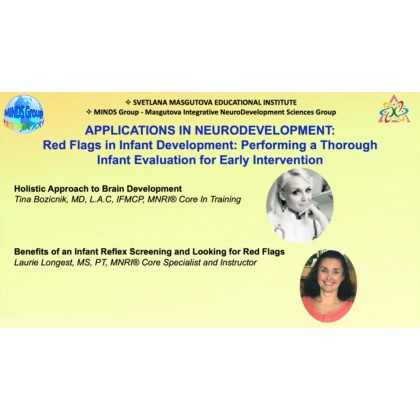
Courses, Conferences & Tools
Applications in NeuroDevelopment: Red Flags in Infant Development - Performing a Thorough Infant Evaluation for Early Intervention to Optimize Future Growth, Health and Well-Being
Applications in NeuroDevelopment: Red Flags in Infant Development - Performing a Thorough Infant Evaluation for Early Intervention to Optimize Future Growth, Health and Well-Being
Brain development is the most intense throughout infancy. How do we facilitate neurodevelopment at birth and throughout infancy and optimize development throughout a baby's life span? How soon after birth should pediatricians and developmental specialists screen/evaluate for red flags that may forecast developmental delays? What should pediatric specialists look for during an evaluation that can help guide a baby's future neurodevelopment?
These questions will be addressed during this MINDS Group lecture, which features a pediatrician's perspective on a holistic approach to brain development and the impact of MNRI® during a holistic infant evaluation. This lecture emphasizes a multi-system test and screening of all infants within the first month of life, which includes checking for toxic exposures, leaky gut, food sensitivities, allergies, sleep routines, and inflammation. The ability to recognize developmental red flags 1 month after birth provides a significant opportunity to initiate early intervention immediately and provide the proper foundation needed to facilitate neurodevelopment. Assuming a proactive holistic approach to a baby's health contrasts with the "wait and see" approach, which is often recommended when parents express concerns to their baby's physician.
This lecture also demonstrates the importance of primary sensory-motor reflex pattern knowledge, how the checks of a specialized professional are important, and how MNRI® can help restore or optimize a baby's development during this neurophysiologically sensitive timeframe.
Presented by:
Tina Bozicnik, MD, L.Ac, IFMCP
Laurie Longest, MS, PT, MNRI® Instructor and Core Specialist
Video Runtime: 1 hour, 53 minutes, 8 seconds.




